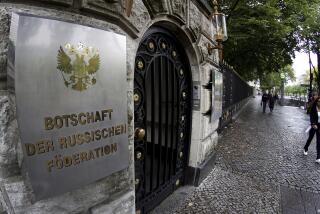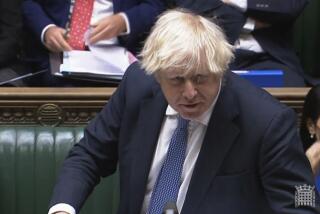Thatcher Assails Soviets on Envoys : Diplomatic Rift Widens; Moscow Orders British Cutback
- Share via
LONDON — A diplomatic dispute between Britain and the Soviet Union deepened Monday as British Prime Minister Margaret Thatcher accused the Soviets of reverting to crude, old-style diplomatic tactics and the Kremlin ordered a sharply reduced British presence in Moscow.
The dispute erupted over the weekend when Britain ordered the expulsion of eight Soviet diplomats and three journalists for alleged spy activities. While initial news of the expulsions was suppressed to avoid disturbing what has been acknowledged here as one of the warmest periods in Anglo-Soviet relations since World War II, Moscow quickly retaliated by announcing the expulsion of an identical list of 11 Britons.
Then, in an additional move, Soviet Foreign Ministry spokesman Gennady I. Gerasimov told a news conference in Moscow on Monday that the number of Britons permitted to live in the Soviet Union would be reduced by 170 from a present level of 375 to 205, a figure he described as a quota agreed upon by the two countries.
“The quota, at 205, has been radically violated, and as a reciprocal measure, it is stated that now we establish the quota of personnel of British representation at the figure of 205,” Gerasimov said.
In London, however, Foreign Office officials said they are unware of any such quota and expressed confusion over Gerasimov’s figure of 375.
“There are 78 registered British staff working in the Soviet Union,” a Foreign Office spokesman said. “We have no idea what he (Gerasimov) is talking about with 375.”
The spokesman speculated that the figure might relate to all personnel, both Soviet and British, who work for British organizations or diplomatic missions in the Soviet Union.
Despite the confusion over the exact target of the latest Soviet action, Thatcher left little doubt about her personal reaction to developments, bristling with thinly controlled anger during interviews Monday with both major British television networks.
“We gave them the chance to say ‘things have changed,’ as we hoped they might have done,” Thatcher said, referring to her government’s decision to handle the initial expulsions discreetly. “They didn’t take the chance, and they showed that things haven’t changed as much as we had hoped.
“That is a very, very significant decision,” she added. “What a pity.”
Later, in a formal statement to the House of Commons, Foreign Secretary Geoffrey Howe justified the initial expulsion order, declaring that “the decision . . . was taken only after very careful consideration and on the basis of incontrovertible evidence.”
“The action we took was absolutely necessary for the security of the country,” Howe said.
No details of the Soviets’ alleged activities were released.
British officials dealing with the affair said illegal activities by the 11 Soviets were first brought to Moscow’s attention as early as last January and that warnings had been repeated since.
“We gave them every opportunity to . . . cease their activities,” said a senior government official. “We didn’t want this to happen.”
Lunched With the Queen
The present diplomatic row comes just one month after Soviet President Mikhail S. Gorbachev’s visit to Britain, during which he strengthened his personal links with Thatcher and lunched with Queen Elizabeth II.
The British monarch’s acceptance of a formal invitation to visit the Soviet Union--the first such invitation since the 1917 Bolshevik Revolution--seemed to symbolize a high point in post-World War II Anglo-Soviet relations.
Despite this warmth, Thatcher has consistently been among the severest critics of Soviet policy.
In a recent dispute within the Western Alliance over how best to react to Gorbachev’s offer to negotiate away short-range nuclear weapons in Europe, she has been the most strident opponent of talks.
Domestic political opponents Monday linked her tough stand on short-range weapons with the diplomatic expulsions.
“There is a NATO (North Atlantic Treaty Organization) summit next week, and Britain is completely isolated there,” said Labor Party foreign affairs spokesman Gerald Kaufman. “Everyone else (but Thatcher) is willing to consider negotiations with the Soviet Union on short-range nuclear weapons at some point. Mrs. Thatcher is alone, and what she’s doing is whipping up the Cold War in an effort to somehow justify her isolation.”
In September, 1985, six months after Gorbachev took power in Moscow, Britain and the Soviet Union engaged in a series of expulsions that affected 31 nationals of either country and left Anglo-Soviet relations in a shambles.
Only 18 months later, however, Thatcher embarked on a triumphant visit to Moscow that established a strong personal relationship with the new Soviet leader and began the revival of ties between the two countries.
More to Read
Sign up for Essential California
The most important California stories and recommendations in your inbox every morning.
You may occasionally receive promotional content from the Los Angeles Times.













